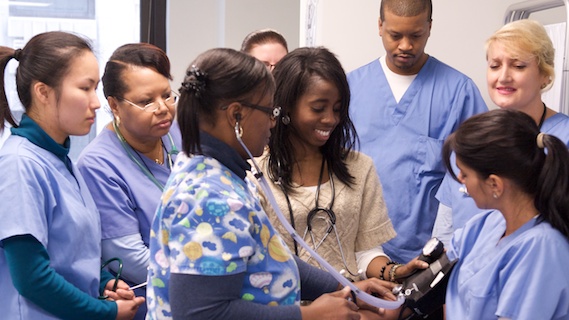
Jobs for certified medical assistants are expected to grow by 31% in the decade from 2010 to 2020, according to the U.S. Bureau of Labor Statistics.
That’s good news, and here’s more: The BMCC Center for Continuing Education and Workforce Development is piloting a Medical Assistant training program that will enable people to take advantage of that trend.
“Certified medical assistants are more employable and earn more than their counterparts in the workplace who are not certified,” says BMCC Dean of Continuing Education, Sunil Gupta.
He adds that students who complete the program will be eligible to take the National Healthcareer Association (NHA) certification exam.
“This can raise the income of people already working as medical assistants, and increase the employability of those looking to enter the field and see if it’s something they want to pursue further—especially by earning an associate degree at BMCC in a related area.”
From collecting blood to collecting payment
Medical assistants take patients’ vital signs and record their medical history. They sterilize equipment, collect blood and tissue samples, and schedule patient appointments. Sometimes they even give shots and assist with medical billing.
The BMCC medical assistant training program prepares students for this wide spectrum of tasks.
“We developed the curriculum in partnership with a federation of clinical sites throughout the New York City area,” says Dean Gupta. “They gave us extremely useful feedback on the skill sets they expect medical assistants to bring to the job.”
The curriculum is also, he says, based on guidelines set by the Medical Assistant Education Review Board (MAERB).
While the first wave of graduates from the course will be eligible to sit for the NHA certification exam, “once we’ve vetted the program through this pilot, “ he says, “we’re hoping to be sanctioned by MAERB and participants will be eligible to sit for that certification exam, as well.”
Training that leads to many paths
The program provides 530 hours of instruction that cover everything from basic anatomy to IV insertion techniques; from diagnostic and procedural coding to time management.
“The first group of students will be incumbent workers in clinical sites that participated in the curriculum development phase of the project,” says Dean Gupta. “Those individuals will be looking to upgrade their skills and take on a higher level of responsibility in their current jobs.
Later, he adds, “the clinical sites will offer internships to those who complete the program.”
The training is funded through the NYC Small Business Services, and those who income qualify are able to apply Individual Training Grants toward their tuition.
“After this training,” Dean Gupta says, “we hope that participants will enroll at BMCC or another community college, and obtain an associate degree in a related area. They might become emergency medical technicians, paramedics, registered nurses, work in medical billing and coding—there are a lot of directions they could go in.”
For more information on this and other certification programs at BMCC, call 212-346-8410 or click here.
STORY HIGHLIGHTS
- Employment for Medical Assistants will increase 31% from 2010-2020
- BMCC’s new Medical Assistant training program leads to industry certification
- This means higher earnings in the short run, and new direction for the long run

